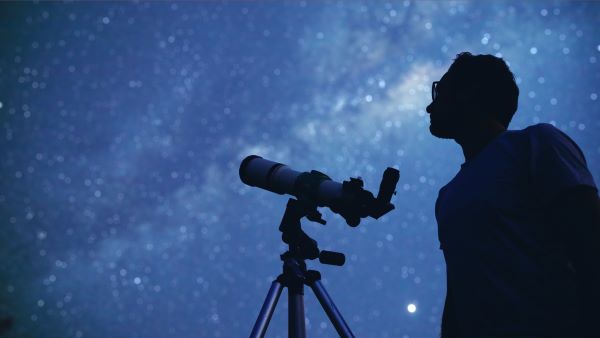Are you interested in outer space? What about the physical laws that describe how the world works? A career path you may not have considered yet is astrophysicist – a type of scientist that brings together the concepts and methods of both astronomy and physics.
To become an astrophysicist, you’re going to need an advanced astrophysics, physics or astronomy degree.

What Is an Astrophysicist?
Astrophysicists are scientists that study the universe to better understand the physical properties of its components. Star systems, galaxies and other celestial objects are all potential subjects of study in the field of astrophysics.
Astrophysicists are concerned with both the universe as it is today and its origins. Research in astrophysics may focus on the theoretical aspects of the field or on applying physics-based methods of studying celestial objects to support the development of solutions to real-world problems related to the study of astronomy.
RELATED: Is Astrophysics a Good Career Choice?
An astrophysicist job description will typically encompass all aspects of conducting research. Your job duties in this career may include the following:
- Develop theories pertaining to stellar evolution, galaxy and solar system formation and the properties of dark matter and black holes
- Design and carry out research studies to test theories
- Analyze data gleaned from experiments to draw conclusions
- Share the findings of their latest research efforts through publications in journal articles and presentations to the scientific community
If you decide to become an astrophysicist, you will work closely with other researchers and scientists, as well as different types of engineers.
The Differences Between Astrophysics, Astronomy and Physics
Astrophysics combines a focus on the subjects of study found in astronomy with methods of analysis drawn from the field of physics, but as a career field, it differs from both of these disciplines.
RELATED: What Are the Differences Between an Astronomy Program and an Astrophysics Program?
While traditional astronomers observe celestial bodies to gather data about them, astrophysicists use the principles and practices of physics to analyze and interpret the physical components of the cosmos. Astrophysics can be viewed as an area of specialization within the field of physics, which studies more broadly the physical properties of matter and the physical laws that apply to matter in the universe – not strictly outside the Earth’s atmosphere.
Deciding between career roles like astrophysicist, astronomer and physician can be difficult, especially if you haven’t yet had a chance to fully delve into the study of these scientific disciplines. Fortunately, the education that prepares you to become an astrophysicist, especially at lower levels of study, can also put you on the path to becoming an astronomer or physicist.
Where Do Astrophysicists Work?
Most astrophysicists conduct research in some capacity, whether in academia, in government agencies, in nonprofit research organizations or in private-sector companies.
Astrophysicist Jobs in Colleges and Universities
As you prepare to become an astrophysicist, you will encounter many astrophysicists who work in the field of higher education. One of the main job duties of an astrophysics professor is to teach astrophysics courses to students, but this isn’t all they do. In addition to their time teaching, astrophysics professors spend time working on research projects in their laboratories and applying for outside funding for new projects they would like to undertake.
Government Jobs for Astrophysicists
Astronomers may look for employment with science- and research-focused federal government agencies, such as federal research laboratories and NASA, the National Aeronautics and Space Administration.
Research Jobs in Organizations and Private-Sector Companies
Nonprofit research institutes and organizations not linked to the government also have a stake in advancing research in the field of astrophysics. Private companies, too, may benefit from studies in the astrophysics discipline. Some examples of other fields and industries in which astrophysicists may find employment include data science and museums, according to the American Astronomical Society (AAS).
Astrophysicist Salary Potential
The median wage for astronomers and physicists as a whole was $147,450 as of 2021, the United States Bureau of Labor Statistics (BLS) reported. For astrophysicists specifically, Salary.com puts the typical salary range for this occupation at between $86,040 and $113,083, with an average salary of $98,136 per year.
RELATED: Top 10 Highest Paying Science Careers
The Bureau of Labor Statistics anticipates favorable job growth rates over the next decade for the physicist and astrophysicist occupation, predicting a faster than average job growth rate of 8% from 2021 through 2031.

The Level of Degree Required for the Astrophysicist Career Path
Astrophysics is a job that requires a great deal of formal education. Students considering a career path in astrophysics should expect to spend several years in college, first completing their undergraduate studies and then a graduate program or doctorate degree program.
Bachelor’s Degree
Before you can begin pursuing an advanced education in astronomy or physics, you need to complete your undergraduate studies. A bachelor’s degree, sometimes called a four-year degree, is the first requirement to move forward with your astrophysicist career preparation.
Bachelor’s degrees typically require at least 120 credits of college-level coursework. The curriculum of a bachelor’s degree in science should introduce students to the principles and practices of designing scientific experiments in accordance with the research techniques used in the scientific method. Science majors also learn the methods of statistical analysis that can be used to draw conclusions from research data in the course of earning a bachelor’s degree.
While some colleges and universities offer bachelor’s degrees in astrophysics specifically, many do not. Aspiring astrophysicists often begin their studies as physics majors and later pursue a graduate degree or a doctorate in astronomy, astrophysics or physics (potentially with a concentration in astrophysics).
If you are already planning to become an astrophysicist, majoring in astrophysics (if available) or physics is probably your best option for your bachelor’s degree. At schools that offer degrees in astronomy at the undergraduate level, this major is another viable bachelor’s degree option.
However, having a background in other branches of science may also prepare you for an astrophysics career path. For example, you might approach graduate-level studies in astrophysics with an undergraduate science degree in Earth science or geology. Even having a background in engineering or computer science may prepare you for more advanced classes in astrophysics, provided that you completed sufficient coursework in physical science.
Master’s Degree
A master’s program in astrophysics will help you develop your knowledge of both astronomy and physics. The curricula of these master’s programs prepare you for a doctoral degree program or just allow you to focus on specific areas of the field of astrophysics, depending on what your end goal is. You should have a solid background in physics and math to help you understand the course material and succeed in your graduate program. Coursework in a graduate degree program for astrophysics will likely cover topics such as general relativity, cosmology, plasma astrophysics, planetary system dynamics and the structure of stars.
RELATED: What Can I Do With a Master’s in Astrophysics?
Alternatively, some schools offer a Master of Science degree program in astrophysics and astronomy, combining these two closely related fields. In the astrophysics and astronomy master’s degree program at Arizona State University, for example, you can expect to complete classes that focus on the stars while also taking courses that cover cosmology as a whole.
Regardless of which master’s degree option you choose, you should try to find research opportunities in the area of astrophysics that appeals to you during your studies. The title of your degree isn’t the only thing that matters in this research-focused branch of science. Your actual research experience, including publications and presentations of your findings, is critical for advancing your career as an astrophysicist.
Astrophysics master’s degrees exist at many schools, but should you pursue one? Even entry-level astrophysicist, astronomer and physicist jobs typically require a doctoral degree, according to the Bureau of Labor Statistics.
On its own, a master’s program won’t qualify you for many jobs in astrophysics apart from basic research assistant roles. That’s why many master’s degrees in astrophysics can only be earned as part of a doctoral degree program. If you do enroll in a separate master’s program, you should know that your career options in astrophysics will be limited unless you go on to earn your PhD.
Doctoral Degree
A doctorate is so critical to success in astrophysics and related careers that you should plan for this level of education from the start. Generally speaking, a PhD program in astrophysics is the degree needed to prepare you for most roles with an astrophysicist job description, as well as careers like professional astronomer and other related careers in research into outer space. In your doctorate program, you should have the chance to learn more about astrophysics topics such as black holes, neutron stars and dark matter.
Some universities offer PhD programs that combine astronomy and astrophysics. These programs will further your knowledge of the cosmos and cover coursework in subjects such as interstellar matter, cosmology and radiation in the universe. PhD programs are research-focused programs of study.
Postdoctoral Research
If you intend to pursue a career in astrophysics research, you may not jump straight into a permanent position in the workforce after completing your PhD. Many astrophysicists choose to pursue postdoctoral programs, paid fellowship positions in which you might stay one year or a few years, either joining existing research programs or branching out in your own independent research efforts.
Not all students who study astronomy at the doctoral level complete a postdoctoral fellowship, and depending on your goals, you might not find a postdoctoral fellowship worthwhile. This path may appeal specifically to astrophysicists working in academia or focusing on a highly specific area of research.
Coursework in an Astrophysics Degree Program
What subjects do you need to study if you want to become an astrophysicist? Naturally, you will attend class to learn the principles and practices of physics and astronomy. Studies in mathematics, including calculus and statistics, are important. Having some background in the foundations of computer science and engineering can also help you succeed in this career.
RELATED: Do Schools Consider Astrophysics and Physics to Be Interchangeable Degrees?
In all of your classes, particularly your science and math classes, you need to obtain good grades. High grades are important for getting into graduate school. Without having the grades you need to get into a master’s or doctoral degree program, you won’t have any chance to become an astrophysicist.
Physics
It should come as no surprise that the subject of physics is crucial to astrophysicists. Physics coursework will help students develop their scientific knowledge of topics such as matter, energy and forces in the world around us and the surrounding universe.
When you study physics, the topics you investigate – such as Newton’s laws of motion – will help you move forward in your preparation for a career as an astrophysicist. Common courses you might encounter when you study physics include statistical mechanics, quantum mechanics, particle physics and classical physics.
Astronomy
Coursework in astronomy, the science of studying the stars and other celestial bodies, is essential to the education of future astrophysicists. Your astronomy coursework will help you learn more about our universe and all of its parts.
Some potential topics of study in astronomy courses include the differences between Earth and other planets both within and outside of our solar system, whether Mars could be suitable for human life and how the use of telescopes allows astronomers and astrophysicists to make observations of the stars at night and the sun during the day.
Calculus
Calculus courses, too, are important for the study of astrophysics – just as they are for the study of other areas of physics. In fact, NASA poses space-based math problems for students that involve calculus. Some examples of these calculus-based mathematics challenges include determining the volume of a crater and estimating the mass of a comet – topics that astrophysics might explore when studying space.
During their undergraduate mathematics studies, students should take a sequence of calculus courses, including Calculus I and Calculus II, at a minimum.
Statistics
Astrophysicists use statistics – the collection, analysis and interpretation of numerical data – in their day-to-day work, so you need a good background in statistics to become an astrophysicist. When astrophysicists analyze their raw data and check to make sure their measurements are reliable, they are using statistics to do so.
In fact, the Center for Astrophysics at Harvard & Smithsonian refers to the discipline that brings together astrophysics, statistics and data mining as astrostatistics. Some of the mathematical data that is being analyzed in the field of astrostatistics is coming from NASA’s satellites, which map our own skies, as well as from telescopes producing terabytes of data in just one night.
An undergraduate course in the math-related field of statistics is likely to cover the basics of probability and statistics, as well as topics like sampling distribution, population distribution and descriptive statistics.
Computer Science
Astrophysicists need strong computer skills to conduct the data analysis work required for this field. Some jobs in astrophysics may require you to use computer software programs to run simulations that will allow you to better understand aspects of the universe.
Most aspiring astrophysicists will benefit from taking at least some computer science courses during their undergraduate program. Having this foundation will prepare you for the more evolved computer skills you will need to use later on in your career. Students who are particularly interested in cultivating strong skills in the use of computer technology may consider pursuing a dual-major program in astrophysics and computer science.
Electrical Engineering
Having a background in electrical engineering might be beneficial to your future as an astrophysicist. Developing skills in electrical engineering equips you with the skills to design equipment that can be used to study space.
Some schools offer dual Bachelor of Science degree programs that combine studies in physics and astrophysics with coursework in electrical engineering. Students pursuing such a program study both of these fields and can expect to cover topics such as quantum computation, nanoscience and engineering design principles and practices.
Gaining Research Experience as a Student of Astrophysics
Undergraduate degree programs may equip students with knowledge of research techniques, but they aren’t known for providing a great deal of hands-on opportunity to conduct research. Still, ambitious students can start getting involved in research projects early on in their career preparation. They just have to know where to look.
Some schools and programs themselves simply offer more undergraduate research opportunities than others. If students are interested in starting their foray into research early, they should look for schools where faculty research projects have received considerable amounts of external grant funding. Colleges and universities that are big on research, particularly at the undergraduate level, will often promote this fact as a selling point.
Your research experience as an undergraduate doesn’t have to come directly from your school. Students may also seek outside research experience through summer research programs offered at various universities, government agencies, medical and healthcare organizations, and research institutes and organizations. The National Science Foundation (NSF), for example, offers a Research Experiences for Undergraduates (REU) program. Your school might also offer internship programs, or you may have the opportunity to seek research-oriented internship placements for yourself. Whether you gain your hands-on experience in research through internship programs, summer research programs, fieldwork experience portions of advanced classes or working in an instructor’s lab on campus, you can gain a lot from this experience. You may even have the opportunity to share your findings with the scientific community by publishing articles in scientific journals.
The more advanced your level of study, the more extensive your research involvement becomes. In a master’s degree program, research will form the basis of your master’s thesis. Doctoral students write their dissertations based on the original research they conduct. If you pursue postdoctoral training, your primary job role will be conducting research, and your job title may be “postdoctoral research fellow,” “postdoctoral research associate” or simply “postdoctoral researcher.”
If you become an astrophysicist, you will need to keep up with the latest research from all over the field throughout your career. You may do this by reading astrophysics books and journal articles and attending astrophysics conferences.
What to Expect When Pursuing a Doctorate Degree in Astrophysics
If you really want to become an astrophysicist, the importance of pursuing a doctorate in astrophysics can’t be overstated. Most astrophysicists have a doctorate, such as a PhD.
On average, earning a PhD in any subject takes students nearly six years, according to U.S. News & World Report. If you pursue a master’s degree first, you can complete your doctorate faster. Some universities offer accelerated programs of study in astrophysics, but these grueling programs typically require full-time, year-round study.
Prospective students should thoughtfully compare doctoral programs to find an option that fits them. Research is huge in a doctoral program. If you want to become an astrophysicist, you should look for a doctoral program where faculty are undertaking research endeavors in topics related to your specific area of interest, such as the study of planets outside of our solar system, the expansion of the universe and the evolution of galaxies.
As a doctoral student, you will use your research work to formulate a strong dissertation and be prepared to defend it. Although many students dread this part of their doctorate program, dissertation defense is an important part of doctoral study. Defending your dissertation demonstrates your level of knowledge about your topic of study, the research methods you utilized, the findings that resulted from your work and opportunities for future scientific inquiry.

